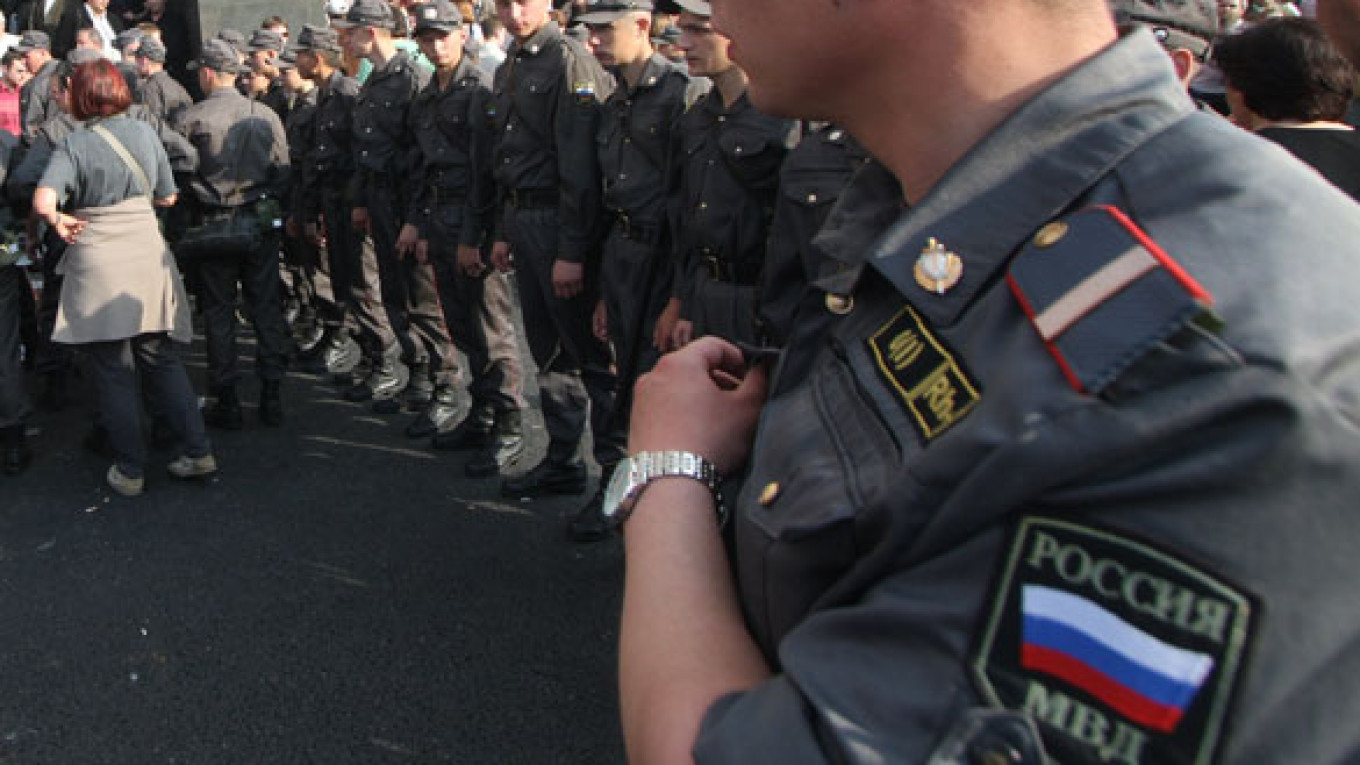Primorye police have declared victory in their search for a gang of “Russian Rambos,” accused of a series of attacks against corrupt cops, even as possible copycats targeted police elsewhere.
Police surrounded a house in the far eastern town of Ussuriisk on Friday in an hours-long operation that ended with two suspects dead and two others detained.
Andrei Nikolayev, head of the Primorye regional police, said the officers did not storm the building, but Reuters reported a five-hour siege and a shootout.
Two suspected members of the gang, Andrei Sukhorada and Alexander Sladkikh, died, possibly killing themselves to avoid capture, while suspect Vladimir Ilyutikov surrendered shortly after the standoff began, and suspect Alexander Kovtun was convinced to give himself up by his mother, Nikolayev said in a statement cited on the Interior Ministry's web site.
Two more suspects, Maxim Kirillov and Roman Savchenko, were arrested earlier in the week, Nikolayev said. All detainees face life in prison.
Previous reports identified Roman Muromtsev, an alleged former veteran of the Chechen campaign, as the leader of the group, but Nikolayev said he was not connected.
Nikolayev said the gang attacked the police to obtain weapons to be used in future money-motivated crimes. But he also said fascist insignias and nationalist literature were discovered along with arms and ammunition in numerous forest hideouts discovered by police.
The group, which is suspected of killing two police officers and wounding six others in a monthlong spree, had been credited with staging the attacks as revenge for police corruption. Media dubbed the group Russia's answer to Rambo.
One of the dead suspects, Sukhorada, was an activist with the banned National Bolshevik Party in Moscow in 2003, group member Roman Popkov wrote on his LiveJournal blog.
Sukhorada, who hitchhiked his way to Moscow from the Primorye region with his teen sister, was an active member of the party and participated in the “peaceful seizure” of the United Russia office in 2004, but he was eventually detained and sent back home, Popkov said, adding that the group lost track of Sukhorada's whereabouts.
Meanwhile, police in two other regions have come under attack in recent days, although it was unclear whether the violence was inspired by the Primorye gang.
One traffic policeman was killed in an attack on a traffic post in the Perm region on Saturday, the local branch of the Investigative Committee said in a statement. About five gunmen dressed in camouflage opened sporadic fire before seizing a Kalashnikov rifle and a gun and burning a police car, it said.
Detectives from the Perm and Sverdlovsk regions as well as the republic of Bashkortostan have been mobilized to chase the attackers.
Also, two traffic police officers were seriously wounded in the Novgorod region late Friday while chasing two gunmen who had attacked a group of Moscow tourists, Interfax reported. The gunmen, whose names were withheld by the police, robbed the tourists in the Demyansky district and got away with their car, money, cell phones and jewelry.
Police detained one gunman, who had served prison time previously for a violence-related crime, while about 350 policemen have been deployed to search for the other suspect, who was on a national wanted list before the attack.
The Primorye gang got extended coverage in the state media, which usually ignore topics that highlight problems within state agencies, suggesting that the authorities might use the gang to push harder for results from Kremlin-ordered reforms within the country's notoriously corrupt police force, said Alexei Mukhin, an analyst at the Center for Political Information.
"The event was used to show the incompetence of the forces of the Interior Ministry, which doesn't welcome the ongoing reforms," Mukhin said.
A Message from The Moscow Times:
Dear readers,
We are facing unprecedented challenges. Russia's Prosecutor General's Office has designated The Moscow Times as an "undesirable" organization, criminalizing our work and putting our staff at risk of prosecution. This follows our earlier unjust labeling as a "foreign agent."
These actions are direct attempts to silence independent journalism in Russia. The authorities claim our work "discredits the decisions of the Russian leadership." We see things differently: we strive to provide accurate, unbiased reporting on Russia.
We, the journalists of The Moscow Times, refuse to be silenced. But to continue our work, we need your help.
Your support, no matter how small, makes a world of difference. If you can, please support us monthly starting from just $2. It's quick to set up, and every contribution makes a significant impact.
By supporting The Moscow Times, you're defending open, independent journalism in the face of repression. Thank you for standing with us.
Remind me later.


